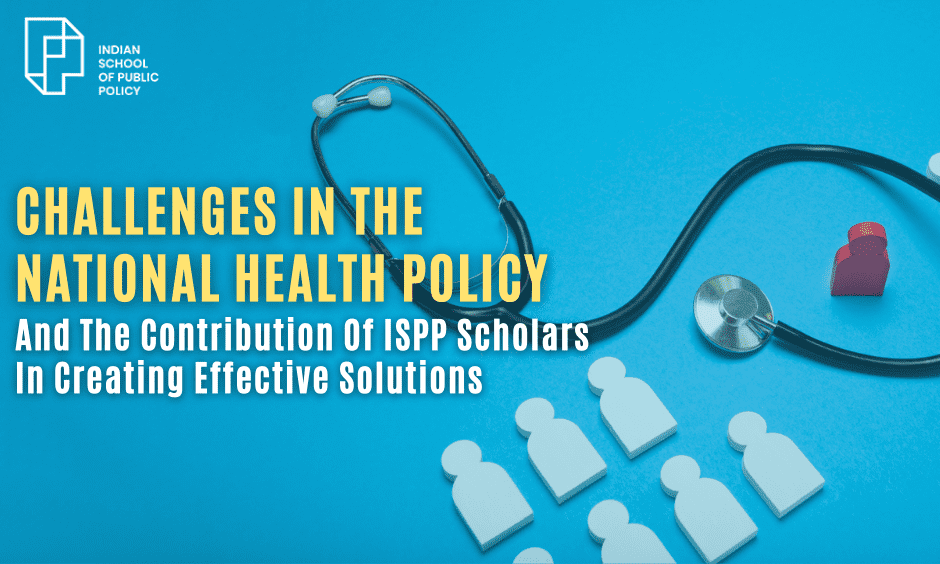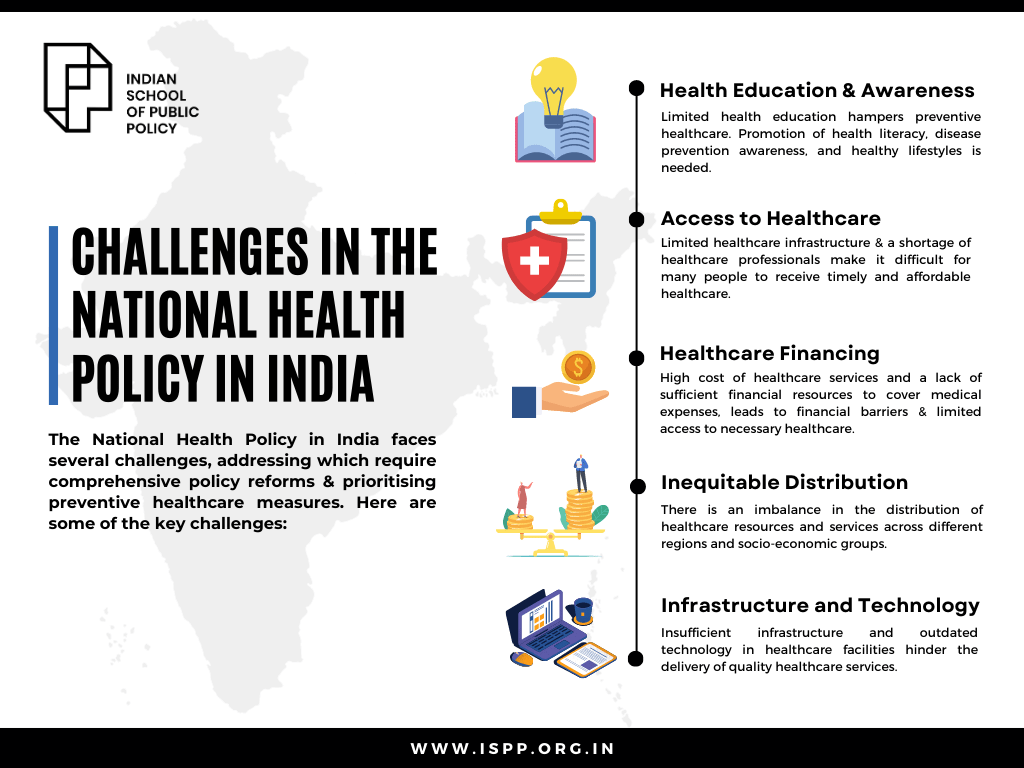
Challenges In The National Health Policy And The Contribution Of ISPP Scholars In Creating Effective Solutions

The National Health Policy is a government initiative to improve the healthcare system in India. It focuses on various aspects of healthcare, such as preventing diseases, promoting good health through different actions, investing in health, strengthening healthcare staff, using advanced technology, and more.
Introduced in 2017, the National Health Policy replaces the old policy from 2002. The new policy has made significant changes and has set new goals. Its main objective is to ensure that everyone in the country can access affordable healthcare services. However, implementing the policy on the ground has its set of challenges that need to be addressed for it to succeed.
What Are The Challenges In The National Health Policy In India?

The National Health Policy in India faces several challenges, addressing which require comprehensive policy reforms, increased healthcare investments, strengthening healthcare infrastructure, improving healthcare workforce distribution, promoting health insurance coverage, and prioritising preventive healthcare measures. Here are some of the key challenges –
Health Education and Awareness – Limited health education and awareness among the population contribute to challenges in preventive healthcare. Promoting health literacy, spreading awareness about disease prevention, and encouraging healthy lifestyles are crucial for improving overall health outcomes.
Access to Healthcare – One of the major challenges is ensuring universal access to quality healthcare services, especially in remote and rural areas. Limited healthcare infrastructure, inadequate facilities, and a shortage of healthcare professionals make it difficult for many people to receive timely and affordable healthcare.
Healthcare Financing – Financing healthcare is a significant challenge in India. The cost of healthcare services can be high, and a large portion of the population does not have access to affordable health insurance or sufficient financial resources to cover medical expenses. This leads to financial barriers and limited access to necessary healthcare.
Inequitable Distribution – There is an imbalance in the distribution of healthcare resources and services across different regions and socio-economic groups. Urban areas tend to have better healthcare facilities and services compared to rural areas. Additionally, marginalised communities and vulnerable populations often face discrimination and limited access to healthcare.
Infrastructure and Technology – Insufficient infrastructure and outdated technology in healthcare facilities hinder the delivery of quality healthcare services. Many healthcare centres lack essential equipment, medical supplies, and adequate sanitation facilities, which impacts the quality of care provided.
Having a robust health policy is crucial as it not only sets rules and guidelines that are beneficial for patients but also for the healthcare system and the overall development and growth of the country – “Jaan Hai Toh Jahaan Hai” (a campaign launched by the Union Ministry for COVID-19 vaccination awareness). By having these protocols, we can reduce mistakes and improve communication when it comes to medical decisions.
Who is responsible for designing these extensive policies?
The PDM Scholars Of ISPP
The Indian School of Public Policy (ISPP) was established in 2018 by a group of respected experts and thinkers in collaboration with the Centre for Civil Society (CCS), a renowned public policy think tank in India. ISPP aims to train a new generation of policy leaders for India. The campus is strategically located in the heart of policymaking, providing easy access to government institutions, think tanks, and non-governmental organisations. The state-of-the-art campus is equipped with top-notch facilities to offer students a world-class learning experience.

Himanshu is a public policy professional, as well as an enthusiast in governmental affairs, who holds a Bachelor of Technology (B.Tech) from IIT (BHU) Varanasi and a post-graduation in Public Policy, Design, and Management from the Indian School of Public Policy. He has a strong sense of determination to improve the governance system. He has previously worked in the Covid War Room of the Union Health Ministry during the pandemic. He has also worked on the rolling out of the PM-Ayushman Bharat Health Infrastructure Mission.
Post Graduate Programme In Public Policy, Design, And Management
The flagship programme at ISPP is the Post Graduate Programme in Public Policy, Design, and Management. This programme is designed for individuals who are passionate about making a positive impact in the field of public policy. As part of the one-year program, students engage in a Capstone Exercise, where they tackle real policy challenges and develop innovative solutions. Alongside academic training, ISPP offers numerous networking opportunities, access to professional forums, and support for careers and placements to help students build a successful future in public policy.
Register your Interest to Study at ISPP
Programme Highlights
HARRIS UCHICAGO: CERTIFICATE IN PUBLIC POLICY – ISPP scholars receive a Certificate in International Development and Public Policy after completing the programme successfully.
IMMERSIVE LEARNING PROJECTS – Exciting opportunities for ISPP students to work on real-time projects in collaboration with client organisations, guided by project leads.
INTERACTIVE LABS – These labs include –
- Writing and Communication Lab – Enhances scholars’ communication skills for effective engagement in development, corporate, and academic settings.
- Antarang Leadership Lab (ALL) – Develops self-awareness and builds leadership skills through experiential learning.
- Quant Lab – Equips scholars with data analysis and visualisation tools in Excel to handle data effectively.
CAREER SUPPORT & PLACEMENTS – Comprehensive training in management, communication, and leadership skills to prepare future leaders for their careers.
TEA & POLICY – An exceptional initiative where public policy professionals from diverse industries engage with scholars to foster meaningful discussions and learning opportunities.
That’s How The Scholars Described Their Experience AT ISPP!
ISPP could not be prouder. Every scholar is greatly valued by the school who knows that they will be instrumental in bringing positive change in the policy climate of the country.
Watch this Valedictorian speak about ISPP creating leaders for action who can lead the country towards a better future.
Ms. Suveera Malhotra, Cohort of 2022.


